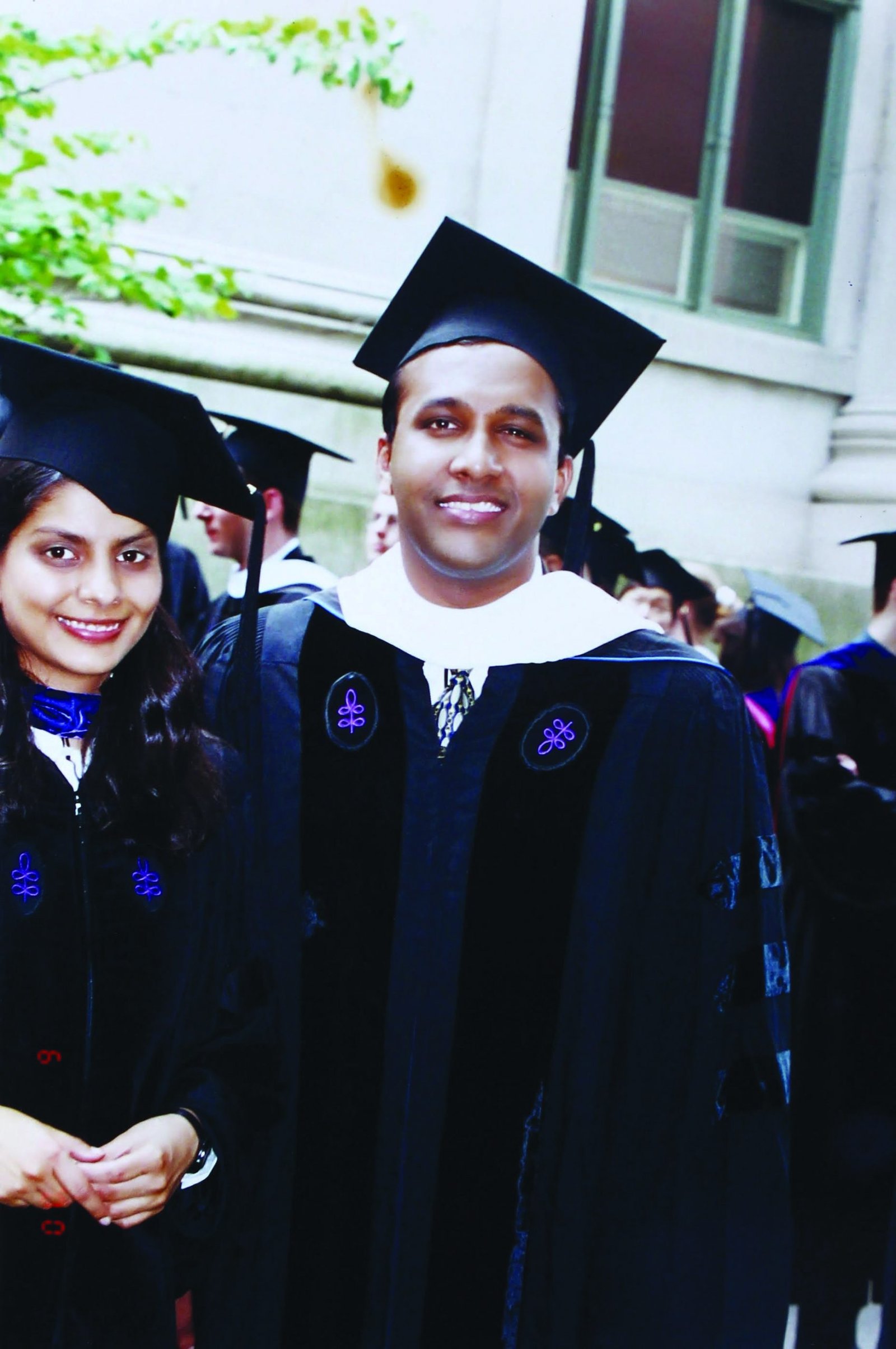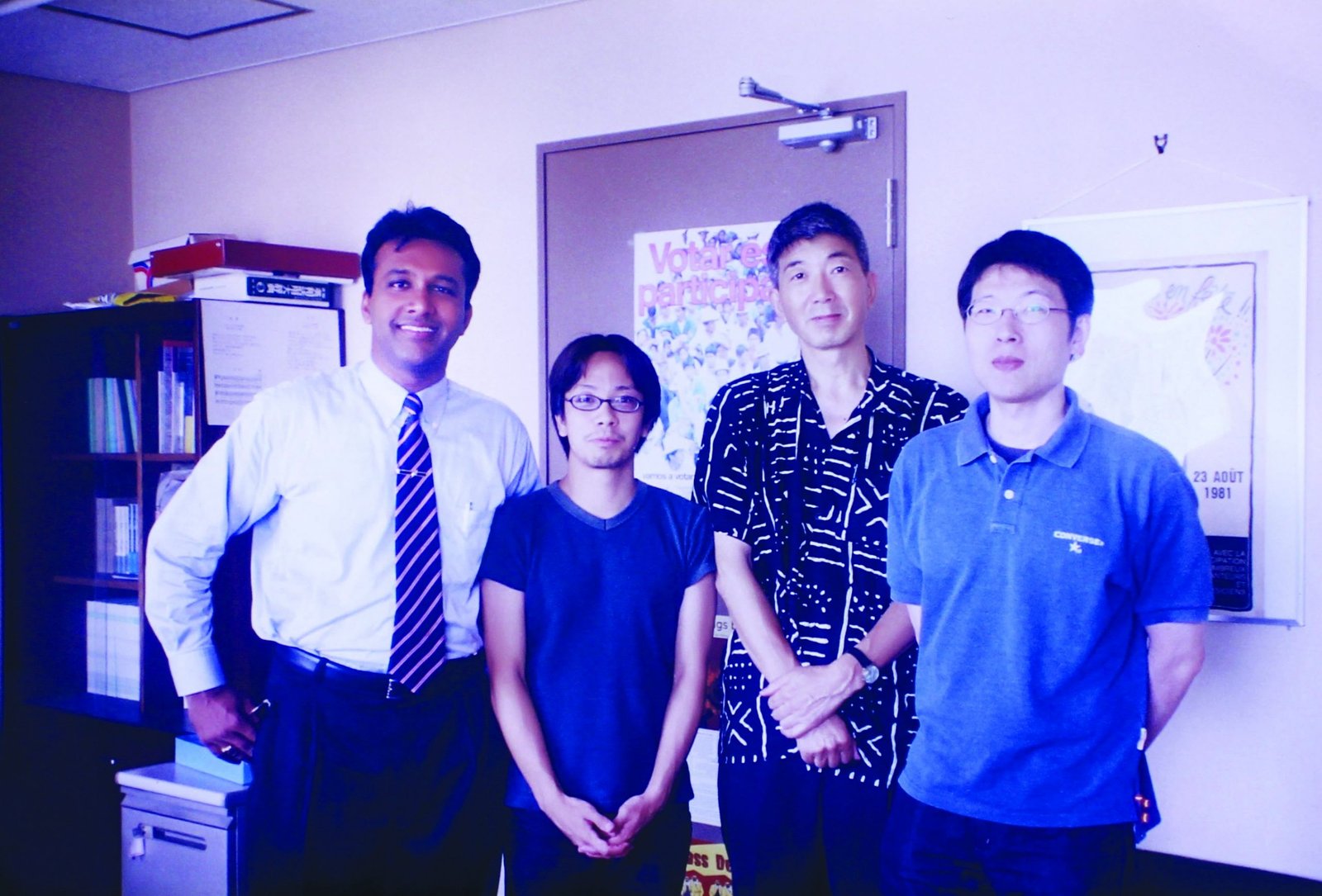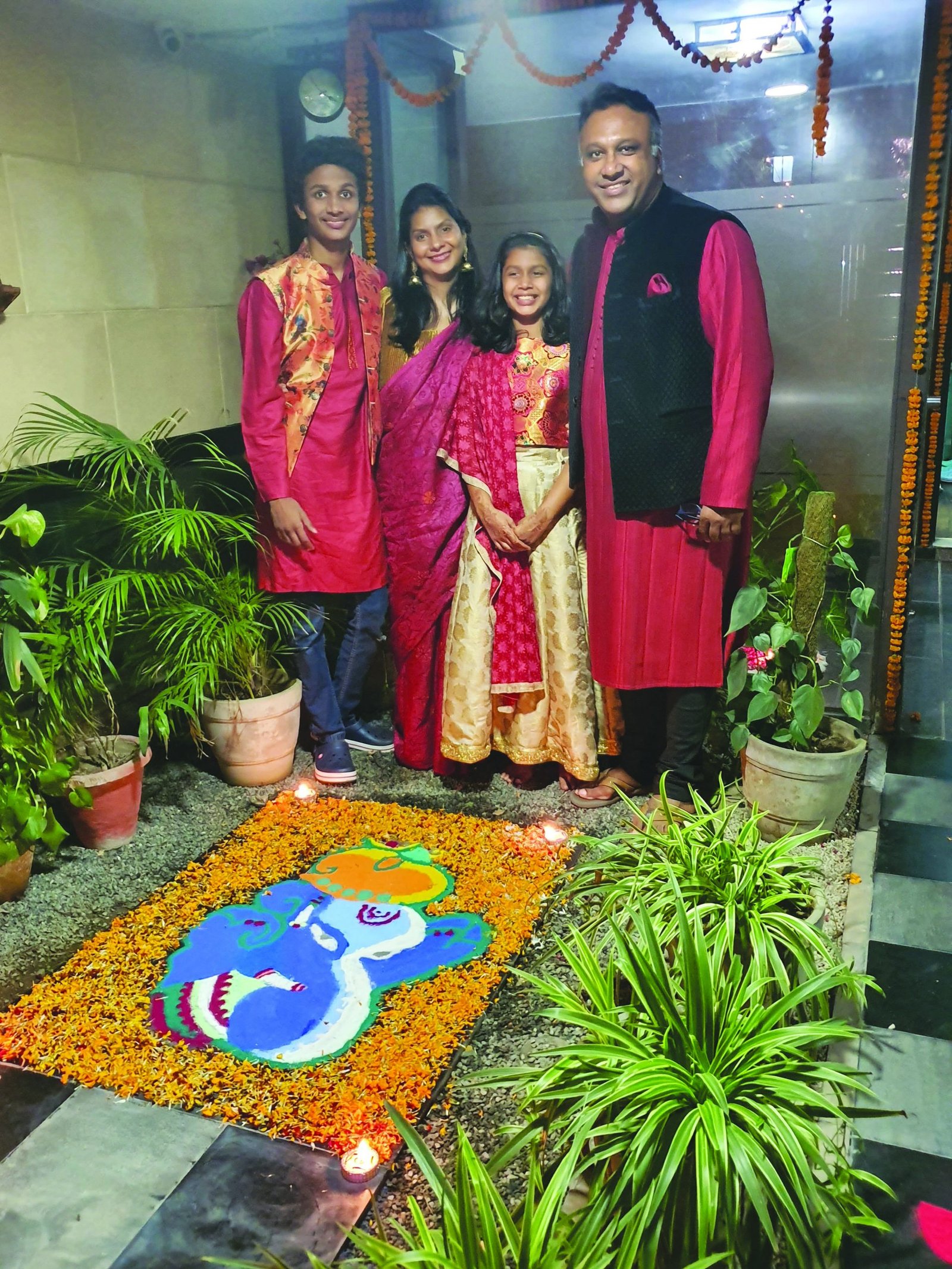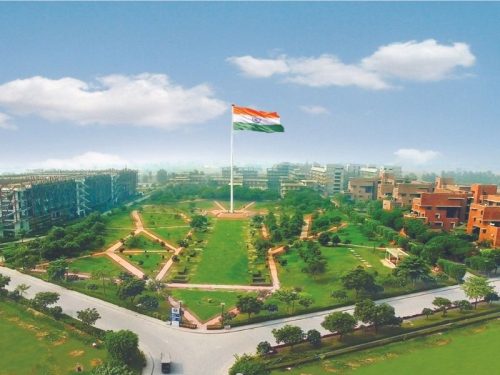No products in the cart.
The Very Extraordinary Dr C Raj Kumar
Within 12 years since it admitted its first batch of 112 students, the Sonipat (Haryana)-based O.P. Jindal Global University (estb.2009) is ranked India’s #1 private varsity and among the global Top 750 in the QS World University Rankings 2022. Credit for the unprecedented evolution of this higher education institution is mainly due to its indefatigable founding vice-chancellor.

O.P. Jindal Global University, Sonipat: national and global encomiums
THE ILL-CONSIDERED 60-WEEK lockdown of all education institutions countrywide for fear of the deadly novel Coronavirus — the longest duration pandemic prompted education cessation worldwide — has hit India’s pre-primary and K-12 children hardest. A string of impact studies conducted by Unicef, Unesco, Pratham Education Foundation and a recent SCHOOL (School Offline and Online Learning) a survey published on September 6, indicate that in some parts of the country, 70-80 percent of youngest children haven’t learned anything at all during the past 18 months, with millions of them in danger of having forgotten what they had learned in the pre-pandemic years.
Moreover, with the great majority of 80 million infants and 220 million children in 1.6 million government anganwadis (early childhood nutrition centres for newborns and lactating mothers), and 1.2 million government primaries entitled to a free-of-charge in-school mid-day meal, having suffered continuous nutrition deprivation, the repercussions on the country’s human resource pool are likely to be devastating for years to come. Certainly, the national goal of closing the academic gap between India and the developed industrial nations of the West, and especially the neighbouring People’s Republic of China, has been delayed by several years, if not decades.
The impact of the unprecedented Covid-induced education lockdown on India’s 42,343 undergrad colleges and 1,043 universities has been less catastrophic. The country’s estimated 38.5 million students in higher education tend to be more ICT (information communication technology)-savvy and better prepared to learn from home, and the majority of public and private HEIs (higher education institutions) are relatively well equipped to provide digital online education. In particular, the country’s 54 Central government and 514 private universities have been able to substantially maintain teaching-learning continuity during the protracted pandemic crisis.
Within the minority of HEIs that have been successful in weathering the Covid-19 storm, the private Sonipat (Haryana)-based O.P. Jindal Global University (JG estb.2009) has not only maintained learning continuity, and successfully graduated 1,569 students in 2020-21, it
has also won numerous encomiums in India and abroad for higher education excellence. This young law, social sciences, liberal arts and humanities university was established 12 years ago in memory of steel tycoon, O.P. Jindal (1930-2005) by a trust chaired by his son Naveen Jindal, a former Member of Parliament, is acknowledged as India’s #1 private university by the globally-reputed Quacquarelli Symonds (QS), a London-based agency that annually ranks 1,300 universities in 100 countries worldwide.
In its latest QS World University Rankings 2022, QS ranks JGU among the Top 750 universities of the world and among the Top 500 worldwide for employability of graduates. Moreover, QS also ranks the university’s Jindal Global Law School #76 worldwide and #1 in India in the QS World University Rankings by subjects and among the Top 150 under age 50 in the QS Young University Rankings 2021.
In the EducationWorld India Private Higher Education Rankings 2020-21 based on the perceptions of 4,141 knowledgeable sample respondents comprising university faculty, final year college/university students and industry leaders, JGU is ranked #3 in India with top score under the parameter of competence of faculty and high scores under infrastructure and internationalism.
The excellent national and global reputation that JGU has acquired is especially commendable since this wholly residential law and liberal arts varsity is only 12 years of age — having modestly celebrated its 12th birthday on September 30. On the other hand, India’s #1 private university in the EW rankings — Manipal Academy of Higher Education (MAHE) — was established in 1953 and the #1 public university — Indian Institute of Science — in 1906.
Credit for record breaking project implementation — JGU was registered as a private university in 2009 and admitted its first batch of 112 students in its law school on September 30 that year — is unanimously awarded to the winning combination of steel industry tycoon and two-term Member of Parliament Naveen Jindal, the founding chancellor and Dr C. Raj Kumar, the polymath founding vice-chancellor of JGU.
In 2006 Raj Kumar, a young (34) whiz kid alum of Madras, Delhi, Oxford, Harvard and Hong Kong universities and at the time professor of law at City University of Hong Kong, had prepared a well-researched paper titled ‘Establishing India’s First Global University’. This comprehensive paper impressed then Union law and justice minister H.R. Bhardwaj of the Congress-led UPA-I government who forwarded it to Jindal, who had been elected on a Congress ticket to the Lok Sabha in 2004 from the Kurukshetra (Haryana) constituency. Also a well-educated commerce graduate of Delhi University with an MBA from the University of Texas at Dallas, at the time Jindal was mourning the tragic demise of his father, steel tycoon O. P. Jindal, in an airplane crash.

Naveen Jindal: rapid evolution
IN HIS EVENTFUL LIFETIME, OPJ promoted and established the Jindal Group of Steel manufacturing companies (Jindal Steel & Power, JSW Steel, Jindal Stainless Steel, JSW Holdings, Jindal Poly Fine) whose aggregate annual revenue is currently estimated at $18 billion (Rs.130,000 crore), as a force to reckon with in the steel industry dominated by the favoured public sector Steel Authority of India and Tata Steel. But even as he grew his empire, OPJ was a generous philanthropist who promoted over a dozen high-quality K-12 schools for
group employees. Therefore Naveen, chairman of Jindal Steel & Power Ltd (annual revenue: Rs.38,988 crore in 2020-21) was highly receptive to Raj Kumar’s proposal to promote an internationally benchmarked world-class law and liberal arts university in memory of the elder Jindal.
“My father had great respect for India’s Constitution and our independent judiciary which has repeatedly upheld citizens’ fundamental rights. Therefore, when Raj very persuasively suggested that we promote a law, and liberal arts university in my father’s memory, I was attracted by the proposition. But the critical factor that persuaded me to commit the large endowment proposed by him, was my assessment of his character and qualities. I was impressed by his nationalism, commitment, thorough research, goal clarity and excellent education background. In Raj, I discerned industry-style project execution and implementation capabilities which are very unusual in academia.
These considerations prompted me to accept his proposal to promote JGU,” recalls Naveen Jindal who green-lighted Haryana’s first private
university (whose establishment required special legislation enacted by the Haryana legislative assembly) with a massive endowment of Rs.500 crore (and subsequently another commitment of Rs.1,000 crore).
Twelve years on, Jindal has no regret that he appointed Raj Kumar the youngest university vice-chancellor in Indian history. “I’m very satisfied — indeed proud — about the rapid progress and evolution of JGU into a truly world-class institution. Having studied at an excellent university in the US myself, I was well aware of the deficiencies and drawbacks of India’s higher education institutions. But Raj has recruited excellent international and national faculty and built a great team very quickly to develop JGU into India’s #1 private university as
certified by QS. It’s an extraordinary achievement,” says Jindal, chancellor of JGU, with evident satisfaction.
Jindal, who took the big risk of bankrolling this young idealist’s dream of establishing a private university on inhospitable Indian soil
where the post-independence ruling elite ill-advisedly adopted the “socialist pattern of society” and was — and remains — wary of “commercialisation of education”, could perhaps be biased in Raj Kumar’s favour. However, there’s a consensus within the
informed academic community that but for Raj Kumar’s grit, determination and extraordinary project conceptualisation and management capabilities, JGU would not have got off the ground this fast.

Raj Kumar & Peter Schuck (2002): “extraordinary achievements”
“I met Raj in 2001 at the NYU Law School and we soon began to discuss his plans to establish a world-class higher education institution in India based on his experiences at Oxford, Harvard, and research of other great universities. Right from the start I was struck by his energy, vision, self-confidence, admiration for education leaders he had observed, his ebullient personality, affability, and ability to convince others to join him in creative endeavours. In the years that followed, he shared these commitments with me and implemented them step-by-step under a broad master plan that he worked out as he went along. The speed and year-by-year expansion of the programmes, schools, and campus were astonishing to me and everyone else who observed them. He proceeded with supreme self-confidence and vision, to prove all doubters wrong. Raj is an entrepreneur in the most fundamental sense with uncanny ability to project the future, and then build an institutional structure for achieving that vision. His sheer physical energy and stamina and also his personal magnetism are the defining characteristics behind his extraordinary achievements,” says Prof. Peter H. Schuck, an alumnus of Harvard and Cornell universities, former deputy dean and currently professor emeritus at the prestigious Yale Law School, who first met Raj Kumar when the latter was a research scholar at New York University. Years later, Schuck was persuaded to teach for a year at the Jindal Global Law School after it admitted its first batch in 2009.
UNDOUBTEDLY, INDIA’S youngest university vice chancellor has developed Mukesh Ambani-style project implementation capability, rare in academia. Within a decade of admitting its first batch of 112 students into its law school, JGU has matured into a full-fledged multidisciplinary university with 12 constituent schools of business, international affairs, government and public policy, liberal arts and humanities, journalism, communication, architecture, banking and finance, business management among others promoted in quick succession. Simultaneously the number of students on its fully residential campus in infrastructurally ill-served rural Sonipat has increased to 8,200 mentored by 910 highly qualified faculty, including 100 full-time international faculty from 41 countries.

Wilkins: extraordinary success story
“Dr. Raj Kumar is a force of nature. When Raj, who I had known as a star student in Harvard’s LLM program, came to see me in 2008 to tell me that he had persuaded Naveen Jindal to make an unprecedented endowment to establish a world-class law school in India, I thought it would take him several years of planning and development. Instead, less than a year later on August 7, 2009, I had the honour of speaking at the inaugural Founder’s Day ceremony for the Jindal Global Law School and O.P. Jindal Global University. But this accomplishment pales in comparison to what Raj has done since that day. In a little more than a decade, under Raj’s inspired leadership, JGU has grown into a full-fledged university, rated among the world’s best with world-class faculty and student body befitting its aspiration to become a truly global institution of higher learning. Along the way, Raj also found time to write several important books and to play a leading role in promoting the development of legal education and legal practice in India and around the world as a key collaborator in the Project on Globalisation, Lawyers, and Emerging Economies that I direct. When I had the privilege of addressing Jindal’s graduating students on August 7, 2019 at the tenth anniversary of the university’s founding, I told the assembled students, faculty and administrators that they were a part of one of the most extraordinary success stories in the history of higher education. And given Raj’s visionary leadership, I have no doubt that JGU’s next decade will be even more remarkable,” says Dr David B. Wilkins, Lester Kissel professor of law, and faculty director of the Center on the Legal Profession at Harvard Law School.
According to Raj Kumar, some important commitments were made by Naveen Jindal when the final decision was taken to launch JGU. “Mr Jindal not only endowed a corpus of Rs.500 crore to roll out the project, but also committed that the university would be run as a not-for-profit institution of higher education, with full academic freedom and total institutional autonomy. He kept his word and ensured his commitments were fulfilled in letter and spirit. Mr Jindal’s only condition was that the first school of the university — the Jindal Global Law
School — should be up and running within a year. I was appointed the founding vice-chancellor on February 18, 2009. Working flat out 24×7 with the excellent engineers of Larsen & Toubro, we completed the 100,000 sq. ft main building of JGLS in six months and admitted our first batch of 112 students and ten faculty on September 30, 2009. I believe this is a project implementation record in Indian higher education,” says Raj Kumar.

Rajan Gupta: great heights prediction
RAJAN GUPTA, IAS WHO served as principal secretary (education) in the Haryana government (2007-10) witnessed the “extraordinary energy, enthusiasm and project execution capabilities” that Raj Kumar invested in getting Haryana state’s first private university up and running in record time. Gupta recalls that when Raj Kumar and his team met with him in 2008, he (Gupta) stipulated two pre-conditions for clearing the project expeditiously, viz, that JGU should have academic collaboration agreements with top-ranked international universities, and that the students’ admissions process should be transparent and entirely merit-based, i.e, “no management quota”.
“A month later Dr Raj Kumar met me again with letters of collaboration and support from Harvard, Yale and New York universities and affirmed that there would be no discretionary admissions quota reserved for the management as was the practice in private higher education at the time. Once these conditions were complied with, the state government which had enacted the Haryana Private Universities Act, 2006 precisely for the purpose of establishing globally benchmarked private universities in Haryana, gave this project its full support including making an amendment to the Act. We are proud that a globally respected private university was established in Haryana in record time and since then, 26 excellent private universities have been promoted in the state. Undoubtedly the major share of credit for executing the JGU project accrues to Dr. Raj Kumar who was undefeatable and met every challenge with a smile. He is an education visionary who is certain to lead JGU to great heights,” predicts Gupta, a law and business management alumnus of Panjab and Wollongong (Australia) universities who was inducted into the IAS in 1983.

Dr. Chockalingam & Dr. Vijayalakshmi with Raj (left) & Ravi Kumar
The evolution of a small-town boy born in Nagercoil in Kanyakumari district (Tamil Nadu) — the elder of two sons of Dr Chockalingam, a criminologist, who retired as the vice-chancellor of Manonmaniam Sundaranar University in Tamil Nadu and his mother Dr. Vijayalakshmi, a medical practitioner who served for over 30 years in public service with the Tamil Nadu government — into a globally admired education entrepreneur before he turned 40, is an inspiring Dick Whittington/Barack Obama genre narrative of seizing rare opportunities and making the most of them.
In pre-liberalisation India of the 1980s, even professionally qualified government employees were modestly remunerated and subject to frequent transfers. Therefore, Raj Kumar’s preschool education was in Nagercoil, and primary education in Kanyakumari, Delhi, Vellore and Chennai until 1985, when he was admitted into class VII of St. Bede’s Anglo-Indian Higher Secondary School, Chennai, where he remained until he completed his higher secondary education.
“We lived a frugal, lower-middle-class life in a two-bedroom home where my parents drilled the importance of education and integrity into my younger brother and me. My father was the privileged owner of a Bajaj scooter on which all four of us piled on for family outings. Moreover, in St. Bede’s, I was exposed to the ethnic diversity and linguistic and cultural plurality of India for the first time, and I
fell in love with it. And this love affair with multi-culturally diverse India continued during my undergraduate commerce education in Loyola College, and at Delhi University, and persists to this day,” says Raj Kumar.

Raj Kumar (left) with legal eagle Ram Jethmalani (2000)
After making an unconventional choice of enrolling for a commerce degree programme at Loyola College, Chennai in 1994, the young graduate continued to shock his friends and relatives further by opting to study law at Delhi University. “The established convention in south Indian middle-class families for top-ranked school leavers and graduates was to study medicine, engineering and chartered accountancy in that order. My decision to study law caused great dismay within my wider family and friends circles. Fortunately, my parents supported my decision,” recalls Raj Kumar.
As a postgrad student at Delhi University’s faculty of law, Raj Kumar developed an abiding interest in study of the law. “Most of my fellow students at DU were doing law as a stepping stone to careers in the civil services. However, I became fascinated with the subject, especially constitutional law. I read all the debates of the Constituent assembly which drafted the unique Constitution of India that bravely promulgated a full-franchise egalitarian democracy governed by the rule of law in a largely illiterate and under-educated society, and enshrined several fundamental rights for all citizens. In Delhi University, I became a votary of the Constitution of India and committed to the rule of law,” he recalls.
After graduating from DU with an LLB in 1997 and being certified by the Bar Council of India, Raj Kumar began his career as a research consultant with the National Human Rights Commission (NHRC). That’s when an opportunity created by the smile of lady luck presented itself to the young legal scholar. Accompanying a friend, who had applied for an Inlaks scholarship for higher study in the UK to Delhi’s St. Stephen’s College, Raj Kumar chanced upon a desk inviting Rhodes scholarship applications from India.

University College, Oxford: first inspiration
“Before that day, I had never entertained the possibility of study abroad because of the vast expense involved. Therefore, after ascertaining that all expenses including travel to the UK of Rhodes scholars were covered by the scholarship, I submitted my application. To my pleasant surprise, I was one of the 16 applicants from India to be shortlisted and following an interview in Kolkata on December 12, 1997 — a turning point in my life — was among six to be awarded a comprehensive and generous Rhodes scholarship to read for a postgrad degree in law at University College, Oxford. As the Master Lord Butler — a former home minister of the UK government — often reminded us, University College (estb.1249) is the oldest college in the English-speaking world,” reminisces Raj Kumar.
Although Indian academics are loath to admit it, there’s a world of difference between universities in India where higher education to all intents and purposes is an extension of school, and universities in the West which are education institutions for serious-minded adults. “My initial experience at Oxford was of shock and awe. Every space in the university seemed to exude a sense of history. I was completely mesmerised by the culture of deep learning, lectures and the tutorial system evolved over centuries at Oxford. That’s when the seed of a similar globally reputed institution of research and deep learning supplemented by orderly governance, was planted in my mind. My experience at Oxford University was my first inspiration,” says Raj Kumar.

Pratibha Jain & Raj Kumar at Harvard graduation day
After he was awarded a BCL (bachelor of civil law) degree by Oxford University in 1999, this young scholar who was deeply immersed in the study of law for love of the subject, had little difficulty winning two scholarships to read law at Harvard Law School. In the millennium year, he was awarded an LLM (Master of Laws) degree by arguably the world’s most prestigious law school.
But at Harvard, Raj Kumar learned more than just law. “While at Harvard, I became aware that the private not[1]for-profit model offered by this close to 400-year-old renowned university was most suitable for India,” recalls Raj Kumar who was subsequently conferred a Ph D in legal science a decade later by the University of Hong Kong in 2011.
With his education odyssey completed, on July 7, 2000, Raj Kumar married his beauteous and equally accomplished college sweetheart Pratibha Jain, whom he had met in Delhi University. Graduating from DU a year after Raj, Jain was admitted into the Harvard Law School, but was persuaded to defer her admission into HLS. Instead, she applied to — and was duly admitted — into Oxford and later accompanied her fiancé to Harvard. After graduation and qualifying for the New York Bar, she was recruited into the practice of Sullivan & Cromwell, one of New York’s premier law firms. As such, she proved to be a valuable support to Raj Kumar who after completion of the New York Bar exam and practising law for a year, discovered that his true calling was the academy rather than the courtroom.
“Therefore, I quit the Bar and spent a year as an unpaid research fellow at New York University, studying universities and higher education systems around the world. For over a year, I was an unpaid academic vagabond. But I received full financial and emotional support from Pratibha, based in New York, for which I will be eternally grateful,” says Raj Kumar.

Meiji Gakuin University sojourn: life-changing experience
After working as a visiting research fellow at NYU for six months, in 2001, Raj Kumar was invited as a visiting scholar by the American missionaries promoted Meiji Gakuin University, Tokyo (estb.1863) to continue his research studies, and deliver some lectures at its Tokyo campus and at Toin University, Yokohoma. The academic sojourn in Japan was this young academic’s first exposure to higher education in Asia and its mixture of the Humboldtian (European evidence-based), American research and innovation combined with ancient native traditions of “patient scholarship and magnanimity in Japan”, proved transformative.
“In Japan, I became fully aware that India’s experiment of divesting research from the university and establishing separate institutes such as CSIR (Council for Scientific and Industrial Research) was not a prudent decision. And my study of several truly world-class Japanese universities transformed my intent to establish a world-class university in India into an obsession,” reminisces Raj Kumar. The Japan sojourn also proved life-changing because it was while in Japan, that in August 2002 Raj Kumar received an offer to serve as a full-time professor in the law school of the City University of Hong Kong.
For this serious student of institutional development, the Japan experience was magnified in Hong Kong, where the governance and legal systems followed the canons of the British-American (and Indian) Common Law, and the medium of instruction was English.

Raj Kumar & Pratibha Jain with Abhimanyu (left) & Avantika
“It’s not well-known in India that Hong Kong is one of the great epicentres of higher education worldwide. This small city has nine large universities, all ranked among the Top 200 in the QS and THE world rankings. Academic remuneration is the most generous worldwide and income tax rates are among the lowest. Research and travel grants are very generous and Hong Kong’s universities attract the world’s finest scholars as faculty. It was here that I wrote a detailed paper titled ‘Establishing India’s First Global University’ and fleshed out my ideas for the India project. During my academically stimulating six years at City U, I frequently travelled to China and was amazed by the rapid modernisation of universities there. I also often visited India and was very disappointed by the multiplication and mindless expansion of private higher education institutions and their poor research and publications record. This made me more determined to perfect my plan to establish a world-class private university in India,” recalls Raj Kumar.
This goal-focused young academic’s inevitable big break came in 2006 at an international conference convened in Delhi by Yale University (at the instance of Prof. Peter Schuck quoted above), UNDP and the not-for-profit Legal Education and Research Society (LEARS). The conference was inaugurated by the late Union law minister Hansraj Bhardwaj (1937-2020). Impressed by Raj Kumar’s presentation of his global university paper, Bhardwaj granted him a 30-minute interview on the eve of Independence Day (August 14), 2006. The interview stretched to 2.5 hours and the very next day Bhardwaj introduced him to Naveen Jindal as recounted above. The rest is yet unfolding history.
 Twelve years on since the Jindal Global Law School admitted its first batch of 112 students, its enrolment has increased to 4,500. And against its intake of 1,550 in 2021, JGLS received 9,000 admission applications. Simultaneously, the number of schools within JGU has increased to 12 with an aggregate current enrolment of 8,200 students mentored by 910 highly-qualified faculty, including 100 drawn from premier universities around the world. Moreover under Raj Kumar’s leadership, this young varsity has crossed many milestones with unprecedented speed, winning plaudits in India and abroad (see above).
Twelve years on since the Jindal Global Law School admitted its first batch of 112 students, its enrolment has increased to 4,500. And against its intake of 1,550 in 2021, JGLS received 9,000 admission applications. Simultaneously, the number of schools within JGU has increased to 12 with an aggregate current enrolment of 8,200 students mentored by 910 highly-qualified faculty, including 100 drawn from premier universities around the world. Moreover under Raj Kumar’s leadership, this young varsity has crossed many milestones with unprecedented speed, winning plaudits in India and abroad (see above).
Even though the unexpected black swan Coronavirus pandemic has forced lockdown of JGU’s 82- acre campus for over 60 weeks, students’ learning continuity has been maintained through introduction of comprehensive digital online learning programmes. According to a JGU spokesperson, in 2020 the JGU faculty conducted 20,000 online classes and lectures, and broadcast a record number of 1,500 Zoom webinars, including more than a dozen for K-12 education leaders and principals in collaboration with EducationWorld.
“In the academic year ended 2021, we graduated 1,569 students. In September 2021, QS ranked JGU among the world’s Top 500 universities for employability of graduates,” declares Raj Kumar.
The rapid speed with which this young pre-teens university has risen in the rigorously researched QS WUR (World University Rankings) 2022 has mightily impressed the QS top brass whose founder-chairman Nunzio Quacquarelli invented the global university ranking league tables in the 1990s.

Ben Sowter: extraordinary speed
“I’m not sure whether JGU’s vault into the QS global Top 750 within 12 years after admitting its first batch of students is unprecedented, but it is certainly extraordinary. I attribute it to the management’s identification of the lacunae in Indian higher education, and not least on the excellent international education credentials, high-energy work ethic and networking skills of its founding vice chancellor, Dr. Raj Kumar,” opines Ben Sowter, a computer science graduate of Nottingham University and currently the London-based senior vice president of QS.
Although leftie arm-chair critics who dominate Indian academia tend to dismiss private universities as elitist, and by implication of no consequence because they levy — and get — tuition and other fees that are sky-high compared to the grossly over-subsidised fees charged by public higher education institutions, by all metrics Raj Kumar has fashioned JGU into a role model globally respected multi-disciplinary law, social sciences and liberal arts university in record time. Defined by its excellent contemporary digital technologies driven infrastructure, the country’s most highly qualified faculty and contented students assured of universal respect for JGU certification, this young varsity (annual tuition-cum-residential fee: Rs.8 lakh with generous means-tested scholarships for over 4,000 students) is set to catalyse an overdue teaching-learning-research revolution within India’s moribund higher education system.
“I have been teaching history in the JGLS degree programme for eight years and it has been a wonderful and fulfilling experience. The management reposes great confidence in faculty which is involved in designing the syllabus and given full freedom to implement the curriculum,” avers Dr. Gitanjali Surendran, an alumna of JNU, Oxford and Harvard universities and currently associate professor of history at the Jindal Global Law School.
Likewise, given a wide range of electives to choose from while reading for majors and permitted free access to lectures of all 12 constituent schools of JGU and assured of preferred internships and placements, JGU students also express high satisfaction with their higher education experience.

Vinay Kodali: life-changing experience
“My five years as a student of the Jindal Global Law School was a wonderful experience beyond all expectations. JGU’s culture is highly inclusive and although it is a liberal institution, it is very well-governed. A range of diverse electives is offered to students who can study any subject from its 12 schools as minors. One of my subjects was ‘Women in the Mahabharata’. It was a life-changing and highly-enabling experience,” recalls Vinay Krishna Kodali, elected president of the Students Council (2017-18). Currently, Kodali is the promoter-director of Accio Foods LLP, Hyderabad, a foods processing company which has “benefitted greatly” from his JGU education experience.
Yet perhaps the most credible endorsement of the very extraordinary Dr Raj Kumar is provided by Dr. Pramath Raj Sinha, former director at McKinsey & Co, USA and founding dean of the blue-chip Indian School of Business, Hyderabad (estb.2002), promoter-trustee of Ashoka University, Sonipat and latterly Plaksha University, Mohali (Punjab).

Sinha: stakeholder management skills
“I’m very impressed but not surprised that QS has ranked JGU India’s #1 private university. Right from the start when I met Raj in 2002, I was impressed by his grit, determination and communication skills, attributes which enabled him to persuade Naveen Jindal to make an unprecedented investment in JGU. And since then over the past decade, he has displayed remarkable skill in managing and inspiring all stakeholders — faculty, students, partner institutions, government and rating agencies. Simultaneously, by writing several books, numerous newspaper columns, hosting dozens of seminars, Raj has made an extrordinary contribution to raising official and public awareness about the importance of high quality higher education,” says Sinha.
Meanwhile, on the occasion of JGU’s 12th anniversary the indefatigable Dr. Raj Kumar has drawn up ambitious plans for JGU’s continuous development and evolution in the post-pandemic era. “We will continue to broaden our multidisciplinary horizon by establishing new schools; upgrading our campus and increasing enrolment; strengthening our digital infrastructure and governance; strive to improve our institutional ranking in global league tables; conduct deep research to help India transform into a knowledge society and engage with several communities for nation-building,” vows Raj Kumar.
That’s an ambitious wishlist. But given the very extraordinary Dr Raj Kumar’s wish fulfillment track record, fasten your seat belts.
Also read: OP Jindal Global University: Rising star of India’s most International University















Add comment